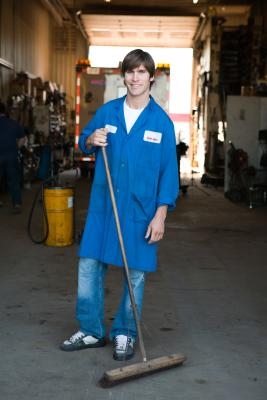
An auto shop contains safety hazards that range from tools to chemicals. Additionally, when power equipment is used in the shop, noise issues arise. Safety issues concern not only the materials and equipment inside the shop, but also the behavior of the workers, and also the automobile owners who may enter the shop. The Occupational Health & Safety Organization (OSHA) has standards that cover the health and safety issues facing auto body repair and finishing shops.
The work habits and behavior of the mechanics and other shop workers are paramount to shop safety. All workers should be thoroughly familiar with the shop's safety rules. Employees should be trained on any equipment they use before they use it, and avoid using damaged or defective equipment. Common sense should always be used --- workers must avoid loose clothing, shun horseplay, and avoid smoking around flammable materials. Also, workers should not attempt any repair or lifting that is too dangerous or heavy for them to accomplish alone.
Auto shops contain dangerous chemicals and materials, including oils, solvents, antifreeze, and gasoline. Flammable items should be stored in a safe area, such as a flammables storage room or a metal cabinet that is vented to the outside. Also, containers and cabinets should be correctly labeled with the contents they hold inside, and the specific hazards that the contents pose. The container lids should also be closed tightly. Material Safety Data Sheets must be available for all toxic chemicals in the shop.
OSHA guidelines covering personal protective equipment maintain that reliable, required equipment must be available in the shop when workers need it. It must also be maintained in a sanitary condition. In an auto shop, this equipment includes an OSHA-approved mask, for respiratory protection; ear protection for when loud tools are being used; eye protection, for work underneath the vehicle or with automotive components that may endanger the sight; and gloves, to protect the hands when handling chemicals or automotive parts.
Daily, ongoing efforts should be routine to maintain the shop as a clean and safe work environment. Walkways should be kept clear of equipment and any equipment's electrical cords. If there is an oil or grease spill, it should be immediately cleaned up. Also, the floor itself must be slip-resistant, composed of noncombustible material, and sealed. The shop lighting should be sufficient for mechanics to work comfortably, without strain.